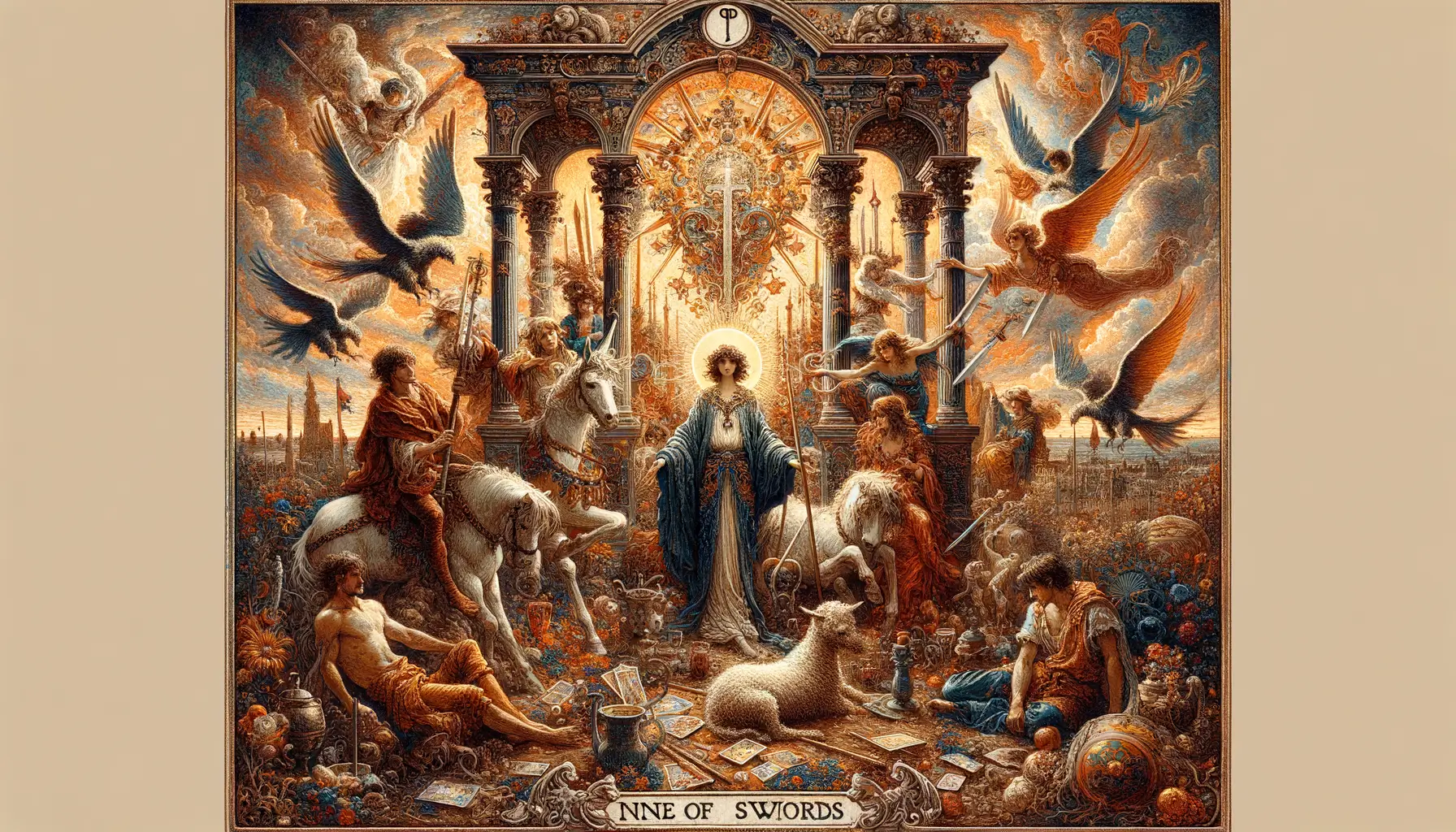The Nine of Swords Tarot Card: A Complete Guide to Symbolism and Meaning

Table of Contents
- 1. What is the Nine of Swords card in the Rider-Waite Tarot deck?
- 2. The Symbolism of the Nine of Swords Arcana and Its Deep Meaning
- 3. The Meaning of the Nine of Swords Upright
- 4. Interpretation of the Nine of Swords in Reverse
- 5. The Nine of Swords as a Significator in a Tarot Spread
- 6. Nine of Swords Card as the Card of the Day
- 7. Meditation on the Nine of Swords Arcana: Transformation of Energy
- 8. Nine of Swords in Romantic Relationships
- 9. Conclusion: Transforming the Energy of the Nine of Swords in Everyday Life

In the world of Tarot, each card carries a unique energy and deep symbolism, reflecting various aspects of the human experience. The Nine of Swords is often called the "card of nightmares" or the "arcana of anxiety," as it embodies deep fears, nighttime worries, and inner conflicts that everyone faces on their life's journey. In this article, we will explore the multifaceted nature of the Nine of Swords, its rich symbolism, meanings in different positions, and practical ways to transform its energy for personal growth and overcoming negative emotional states.

What is the Nine of Swords card in the Rider-Waite Tarot deck?
The Nine of Swords in the Rider-Waite Tarot deck embodies deep anxiety, internal fears, and emotional suffering. It is the ninth numbered card in the Suit of Swords, symbolizing the culmination of mental conflicts and psychological difficulties. In essence, the Nine of Swords represents a moment of peak tension, when anxious thoughts and fears reach their height, causing insomnia, emotional exhaustion, and a sense of helplessness in the face of inner demons.
In the traditional depiction of the Rider-Waite deck, the Nine of Swords card shows a person sitting in bed, covering their face in despair. The figure has evidently just awakened from a nightmare, or perhaps cannot sleep at all due to haunting thoughts. Above the figure's head hang nine swords, indicating the weight of negative thoughts that literally loom over the person’s consciousness, preventing them from finding peace.
The card's visual symbolism is rich with elements indicating deep emotional distress. The darkness of the room symbolizes the obscured consciousness and the inability to clearly see the situation in its true light. The nine swords hanging vertically on the wall represent accumulated fears, anxieties, and negative thoughts that seem insurmountable and threatening. The bed symbolizes a place where one should find rest and recovery, but instead faces inner demons and tormenting thoughts.

The Symbolism of the Nine of Swords Arcana and Its Deep Meaning
The image of a person sitting on a bed with their face in their hands is a key element of the card, visually conveying a state of deep anxiety and despair. This gesture of self-protection shows a desire to hide from the world and one's own thoughts, an inability to cope with emotional pain. The posture of the figure expresses helplessness and vulnerability in the face of their fears.
The nine swords hanging on the wall above the figure symbolize the destructive power of negative thoughts and fears. The vertical arrangement of the swords indicates that these fears are more a product of the mind than a real threat. They are literally "suspended" in the person's consciousness, creating a constant sense of danger and threat, even if objectively the situation is not that dire.
A particularly significant element on the card is the engraving at the foot of the bed, depicting a scene from a battle. This detail symbolizes an internal struggle, conflict, and the need for protection from one’s own destructive thoughts. The engraving may also suggest that current fears and anxieties have roots in past traumatic events or conflicts that have left a deep emotional mark.
The lack of sufficient lighting in the room embodies a foggy state of mind, an inability to see the situation clearly due to the predominance of anxious thoughts. The darkness also symbolizes isolation and loneliness, which often accompany states of deep anxiety and depression, when a person feels cut off from the world and misunderstood by others.
The light gray clothing of the figure reflects the person’s internal state-uncertainty, vague anxiety, and sadness. This neutrality of color may also indicate emotional exhaustion, when the bright colors of life are temporarily lost due to the predominance of negative thoughts and emotions.
An interesting contrast to the overall gloomy tone of the image is the red roses on the blanket. They serve as a symbol of hope and the possibility of rebirth even in the darkest moments. The red color of the roses reminds us of the passion for life, which may be temporarily clouded by anxiety but never completely disappears. This indicates that even in a state of deep despair, there is always potential for healing and rebirth.

The Meaning of the Nine of Swords Upright
When the Nine of Swords appears in a spread in the upright position, it signals a period of deep anxiety, fear, and emotional distress. This card indicates a time when internal fears and worries reach their peak, causing insomnia, stress, and a sense of psychological pressure. One might feel trapped by their own negative thoughts, unable to find a way out of the situation.
The appearance of this card is often associated with a period when anxieties and fears persist even in sleep, leading to nightmares and sleep disturbances. The Nine of Swords reflects a state where thoughts of problems are relentless, cyclically drawing a person back to the same worries, creating a sense of hopelessness and lack of control over the situation. It is important to note that often these fears are exaggerated or even entirely illusory, not matching the actual level of threat.
Key concepts associated with the upright position of the Nine of Swords include fear, anxiety, apathy, insomnia, stress, depression, worry, frustration, obstacles, a sense of hopelessness, experiencing grief or loss, deep psychological pressure, indecision, suffering from mental anguish, feelings of sorrow and despair, internal disappointment, lack of confidence in the future, difficulty in communication, neuroses, facing troubles, panic fear, inability to choose, and seeking a way out of the situation.
For those who encounter this card, it is recommended to stop avoiding their fears and confront them directly. It is important to understand that many fears are exaggerated or illusory, and only through recognizing and accepting them can one begin the healing process. Paying more attention to thoughts and feelings, without allowing them to entirely control life, is crucial. It's beneficial to shift focus from negative aspects to finding solutions and positive sides of the situation. In some cases, seeking support from loved ones or a professional psychologist can be helpful in overcoming deep fears and anxieties.

Interpretation of the Nine of Swords in Reverse
In the reversed position, the Nine of Swords card signifies the beginning of the healing process and liberation from deep fears and anxieties. This state can be associated with slowly awakening from the "nightmare" of negative thoughts and gaining a new perspective that allows one to see the situation more realistically. The person begins to realize that many fears were exaggerated or entirely baseless and gains tools to overcome inner turmoil.
When the Nine of Swords appears in a reversed position, it often suggests that the worst is over and a period of recovery and healing is starting. The person may begin to find ways to manage their anxious thoughts, return to a normal sleep pattern, and gradually free themselves from the weight of psychological pressure. This card in the reversed position can also indicate a moment of insight when the true sources of fear are understood, and there's an opportunity to work through them.
Key concepts associated with the reversed Nine of Swords include the path to healing, overcoming obsessive thoughts and fears, correcting past mistakes, acknowledging and accepting one's fears, overcoming anxiety and depression, seeking meaning, enlightenment, liberation from fear and suppression, overcoming mental pressure, faint hope, the possibility for positive change, the chance to stop the cycle of negative thinking, understanding one's fears and neuroses.
To work with the energy of the reversed Nine of Swords, it's recommended to continue the process of self-analysis and awareness of one's fears, but with greater confidence in the possibility of overcoming them. It's important to recognize the progress already made and to reinforce positive changes in one's thinking. This is a good time to explore relaxation techniques, meditation, or other practices that help calm the mind and strengthen emotional balance. It may also be beneficial to seek support from close people or professionals who can help secure positive changes and prevent a return to the previous state of anxiety.

The Nine of Swords as a Significator in a Tarot Spread
As a significator, the Nine of Swords indicates a period of deep internal crisis when a person experiences intense anxiety, fear, or emotional distress. This card reflects a stage where negative thoughts and worries become so powerful that they significantly impact the quality of life, causing insomnia, constant tension, and a sense of helplessness.
The Nine of Swords as a significator can refer to people who are currently in a state of emotional exhaustion or psychological crisis. Such individuals often display signs of chronic anxiety, heightened suspicion, and a tendency toward negative thinking. They may suffer from insomnia or nightmares, repeatedly running catastrophic scenarios through their minds and having difficulty concentrating and making decisions due to overwhelming fear.
This card is suitable as a significator for people who are experiencing a period of deep emotional crisis, especially if this crisis is related to internal fears and anxieties rather than external circumstances. The Nine of Swords also aptly represents people who are prone to self-criticism, perfectionism, and overly analytical thinking, which can lead to "mental loops" of negative thoughts. They often have a tendency to exaggerate the danger of a situation and see the worst possible outcome, even when the risk is not objectively significant.
In the reversed position, the Nine of Swords as a significator can indicate people who are in the process of recovering from a period of intense anxiety or fear. These individuals begin to recognize the irrational nature of many of their fears and learn to manage their thoughts. They may be actively working on overcoming negative emotional states, using various self-help methods or seeking professional support. They develop the ability to evaluate the situation more objectively and find constructive ways to solve problems, not letting fear paralyze their will and ability to act.

Nine of Swords Card as the Card of the Day
When the Nine of Swords appears as the card of the day, it invites attention to your emotional state and the anxious thoughts that may be haunting you at the moment. This is a special day to become aware of and analyze your fears, try to understand their true sources, and begin working on overcoming them.
The energy of the Nine of Swords as the card of the day warns of the possibility of increased anxiety and a tendency towards negative thinking throughout the day. On such a day, a person might feel emotionally exhausted, anxious, and inclined to see situations in a worse light than they actually are. It's important to remember that many fears are exaggerated or unfounded, and to try not to make important decisions under the influence of anxiety.
The Nine of Swords as the card of the day reminds us of the necessity to care for our mental health and emotional well-being. On this day, it is useful to practice relaxation techniques, meditation, or other methods that help calm the mind and reduce anxiety levels. It is also important to avoid self-isolation, which can intensify negative emotions, and instead seek support from loved ones or professionals.
A day marked by the Nine of Swords is favorable for self-reflection and an honest acknowledgment of one's fears and anxieties. It is a good time to start working with a psychologist or therapist if anxiety is frequent or intense. It is also beneficial to use this day to practice mindfulness and being present in the moment, which helps break the cycle of anxious thoughts and regain a sense of control over the situation.

Meditation on the Nine of Swords Arcana: Transformation of Energy
The Nine of Swords, being an embodiment of deep anxiety and fears, provides a powerful opportunity for transforming negative emotional states and achieving inner peace. Meditation on this card allows you to realize the sources of your fears, face them head-on, and begin the healing process. When properly worked through, the energy of the Nine of Swords can help release cycles of negative thinking and foster a healthier approach to life's challenges.
For effective meditation on the Nine of Swords, find a quiet, comfortable space where you won't be disturbed. Place the image of the card in front of you and carefully examine every detail, paying special attention to the figure covering their face with their hands and the nine swords hanging overhead. Close your eyes and imagine yourself in the place of this person, feel their anxiety and fear without trying to deny or suppress these emotions.
During the meditation, acknowledge and name each of your fears or anxieties with compassion and understanding. Imagine that each of the nine swords corresponds to a specific fear or anxious thought. As you acknowledge and accept each fear, visualize the corresponding sword losing its sharpness and transforming into a beam of light. This light begins to dispel the darkness in the room, symbolizing the clarification of consciousness and release from irrational fears.
Enhance the meditative practice with breathing work. With each inhale, imagine accepting your fears and anxieties, and with each exhale – releasing them, transforming them into wisdom and understanding. Visualize how with each breathing cycle the room becomes brighter, and you feel increasing calm and clarity of mind.
Then move on to positive visualization: imagine that all swords have completely transformed into rays of light that now protect and support you instead of threatening. The figure on the bed gradually calms down, lowers their hands from their face, and starts seeing the situation clearly and objectively. Feel your body relax and your mind calm down, freeing itself from the burden of anxiety and fear.
This meditation helps to realize that most fears exist only in our imagination and can be transformed through acceptance and awareness. It fosters the development of inner strength and confidence needed to overcome states of anxiety and achieve emotional balance.
At the end of the meditative practice, express gratitude for the experience and insights gained. Slowly return to your normal state of consciousness, remembering that you always have the ability to transform your fears into a source of strength and wisdom. Upon opening your eyes, write down any insights or understandings that came to you during the meditation.
Regular meditation on the Nine of Swords helps develop the ability to recognize irrational fears, interrupt cycles of negative thinking, and find inner peace even in challenging life situations. It teaches us that many of our fears are just "swords hanging in the air," which seem threatening but cannot truly harm us unless we allow them to control our minds.

Nine of Swords in Romantic Relationships
The Nine of Swords card in an upright position in the context of romantic relationships reflects a period of deep anxiety, fears, and emotional suffering related to the love sphere. In romantic readings, this card may indicate a relationship that has become a source of concern, sleepless nights, and constant tension. There may be unresolved conflicts, misunderstandings, or hidden fears that hinder achieving harmony and mutual understanding with your partner.
When the Nine of Swords appears in a relationship reading, it's likely that one or both partners are experiencing intense fear or anxiety about the future of the relationship. This could be fear of abandonment, fear of intimacy or closeness, fear of repeating past painful experiences, or anxiety due to misunderstandings and conflicts. The card warns that these fears may be exaggerated or even completely illusory, but they have a real negative impact on the relationship's quality.
In a reversed position, the Nine of Swords in the context of romantic relationships indicates the gradual overcoming of fears and anxieties related to the love sphere. This might be a period where areas of conflict and disagreement start to clear up, and the opportunity arises to find a constructive solution in a complex situation. Although some fears and worries still exist, they begin to diminish, and the relationship gradually moves toward greater harmony and mutual understanding.
The reversed Nine of Swords encourages being more open and sincere in expressing feelings and concerns. Instead of allowing fears to destroy the relationship, it's important to use them as an opportunity for deeper understanding of oneself and the partner. This card may indicate a period of emotional healing after difficult times in the relationship, where partners start to understand each other better and build healthier communication.
In both cases, whether upright or reversed, the Nine of Swords reminds us of the importance of healthy emotional communication in relationships. Fears and anxieties that remain unspoken tend to grow and intensify, while open dialogue and mutual support help overcome even the deepest fears and strengthen the emotional connection between partners.

Conclusion: Transforming the Energy of the Nine of Swords in Everyday Life
The Nine of Swords in the Rider-Waite Tarot is not just a card of fear and anxiety but also a powerful tool for self-discovery and personal growth. Working with the energy of this card helps to recognize and transform deep fears, learn to manage anxious thinking, and gain inner strength to overcome emotional crises.
Integrating the lessons of the Nine of Swords into everyday life means developing the ability to recognize irrational fears and anxieties, preventing them from controlling thoughts and actions. It involves distinguishing real threats from imaginary ones and maintaining emotional balance even in challenging situations. The properly processed energy of the Nine of Swords teaches us that most of our fears exist only in our imagination and can be overcome through awareness and acceptance.
Whether you use Tarot for divination, meditation, or self-discovery, the energy of the Nine of Swords reminds us of the importance of caring for our mental health and emotional well-being. It teaches us that even the darkest nights of the mind ultimately give way to dawn and that every crisis contains the potential for profound transformation and growth.
This is the true value of the Nine of Swords card – in its ability to show us how our own thoughts can create a prison of fear and anxiety, but also how, through awareness and acceptance, we can free ourselves from this prison and find inner harmony and peace.
Frequently Asked Questions About the Nine of Swords in Tarot
The Nine of Swords is often considered one of the most challenging cards in the Tarot deck due to the intensity of emotional suffering it symbolizes. It reflects a moment of greatest mental tension when a person is trapped by their own fears and anxieties, experiencing insomnia, nightmares, and deep emotional exhaustion. Unlike other difficult arcana that often point to external hardships or conflicts, the Nine of Swords represents the inner struggle with one's own demons, from which there is no escape or hiding. This card illustrates how our own thoughts can become the source of profound suffering, creating a mental prison that seems insurmountable. However, it's important to remember that even in this card, there is a symbol of hope-the red roses on the blanket, reminding us that even the darkest night of the soul ultimately gives way to dawn.
Distinguishing real concerns from the irrational fears represented by the Nine of Swords involves a conscious evaluation of emotional reactions and their alignment with objective reality. Real concerns are usually based on specific facts and have reasonable grounds, whereas the fears of the Nine of Swords are often exaggerated or completely detached from reality. A useful method is to write down your worries and objectively analyze their likelihood and possible consequences. Ask yourself: "How likely is it to happen?" and "What's the worst that can happen, and can I handle it?" It's also important to pay attention to physical symptoms of anxiety - a racing heart, sleep disturbances, constant tension - as they often indicate irrational fears. Remember that the fears of the Nine of Swords tend to cyclically return and intensify at night when the mind's defense mechanisms are weakened, whereas real concerns are usually more stable and rational.
To overcome the negative state associated with the Nine of Swords, several practical techniques are effective in calming the mind and transforming anxious thoughts. Mindfulness and meditation practice help you learn to observe your thoughts without identifying with them, understanding that "you are not your thoughts." The technique of "journaling"-regularly recording your fears and anxieties-helps to objectify them and reduce their emotional intensity. Cognitive restructuring, a core method of cognitive-behavioral therapy, teaches you to identify and transform negative thinking patterns, replacing them with more realistic and adaptive ones. Physical activity, especially outdoors, effectively reduces anxiety levels by releasing endorphins and shifting focus from internal experiences to the outside world. Breathing exercises, progressive muscle relaxation, and creating healthy bedtime rituals are also beneficial in improving sleep quality and reducing the nighttime anxiety characteristic of the state of the Nine of Swords.
The appearance of the Nine of Swords in a future tarot reading requires careful analysis and should not automatically be seen as a prediction of disaster. Rather, this card warns of the possibility of a period of heightened anxiety and emotional tension that may arise if a person does not address their current fears and worries. The Nine of Swords indicates the need for psychological preparation for upcoming challenges and the development of healthy stress coping mechanisms. It's important to remember that this card often reflects a subjective perception of the situation, rather than an objective reality, emphasizing that future difficulties may be amplified by fear. On a positive note, the Nine of Swords can point to an upcoming period of deep inner work and self-discovery, which, although emotionally challenging, will ultimately lead to liberation from old fears and the acquisition of greater psychological resilience in the face of life's challenges.
Despite its reputation as the "nightmare card," the appearance of the Nine of Swords in a spread can have several positive interpretations depending on the context and surrounding cards. First and foremost, it may indicate a "crisis of insight" moment, where the individual finally acknowledges the depth of their fears and anxieties, which is the first and necessary step toward healing. The Nine of Swords can serve as an important signal that it's time to focus on mental health and prioritize self-care, possibly by seeking professional help. In a spiritual context, this card may symbolize the "dark night of the soul" – a challenging but transformative period necessary for deep spiritual growth and enlightenment. Especially when combined with positive cards, the Nine of Swords can suggest that a period of intense anxiety is coming to an end, and the individual is ready to let go of old fears and begin the healing process. In a professional context, it can warn of a tendency toward excessive self-criticism and perfectionism, helping to recognize the need for a more balanced approach to work and personal achievements.









